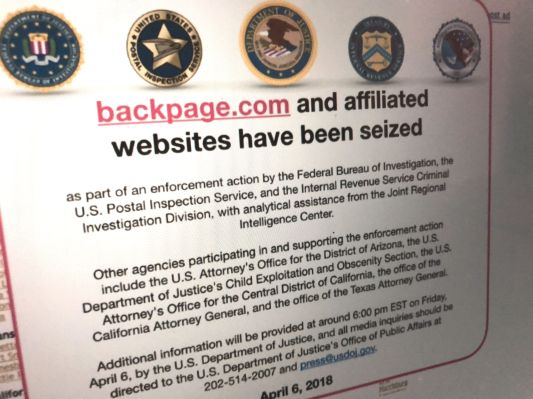Last week, online classified site Backpage.com was suddenly replaced with a warning noting that it had been seized by the FBI. The move was abrupt, but not exactly a surprise for a site that’s been mired in controversy for years.
The Justice Department had previously acknowledged the move, but it’s shedding more light on the 93-count federal indictment. It’s a laundry list of activities for which you definitely don’t want to get busted by the DOJ, including,
Crimes of conspiracy to facilitate prostitution using a facility in interstate or foreign commerce, facilitating prostitution using a facility in interstate or foreign commerce, conspiracy to commit money laundering, concealment money laundering, international promotional money laundering, and transactional money laundering.
Defendants include Michael Lacey, whose home was the subject of the FBI raid, and fellow co-founder James Larkin, both of whom were also the subject of warrants during a 2016 raid on the site’s Dallas headquarters.
Jeff Sessions didn’t mince words on this one.
“For far too long, Backpage.com existed as the dominant marketplace for illicit commercial sex, a place where sex traffickers frequently advertised children and adults alike,” the attorney general said in a statement tied to the news. “But this illegality stops right now. Last Friday, the Department of Justice seized Backpage, and it can no longer be used by criminals to promote and facilitate human trafficking.”
The 61-page indictment spells out the offending ads in black and white, adding that “By 2008, if not earlier, the Backpage defendants were aware that the overwhelming majority of the website’s ‘adult’ ads involved prostitution. Nevertheless, the Backpage defendants made a financial decision to continue displaying those ads.”
The filing goes on to explain that the site’s owners wouldn’t delete the offending ads altogether, for fear of being put in the “uncompetitive” position of a Craigslist.
The raid, incidentally, came roughly a week after Craigslist pulled its own personals, for fear of repercussion as Fight Online Sex Trafficking Act (FOSTA) passed both the House and Senate. That bill has been criticized by sex workers and internet rights activists for the onus it puts on sites hosting third-party content.
